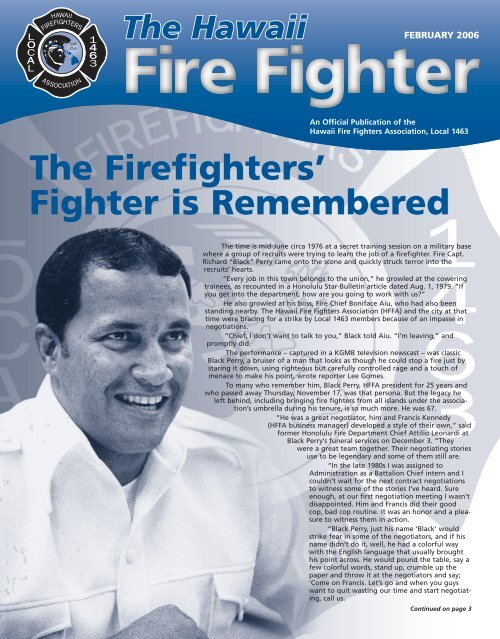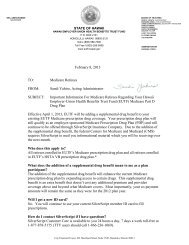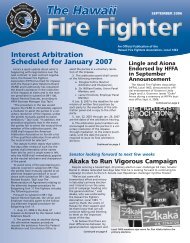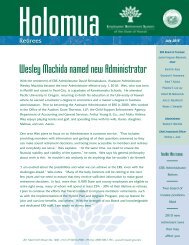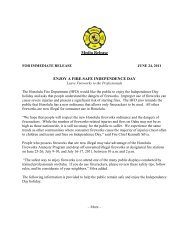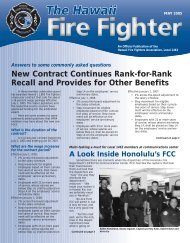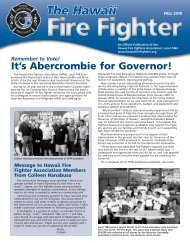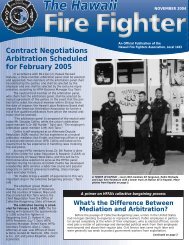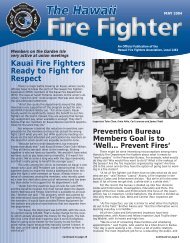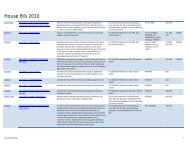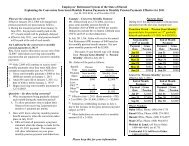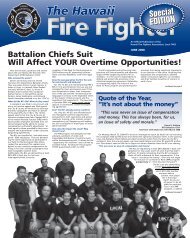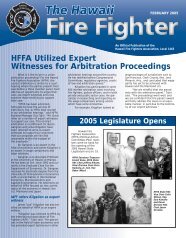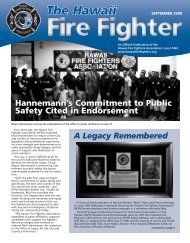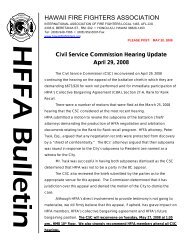The Firefighters' Fighter is Remembered - Hawaii Fire Fighters ...
The Firefighters' Fighter is Remembered - Hawaii Fire Fighters ...
The Firefighters' Fighter is Remembered - Hawaii Fire Fighters ...
Create successful ePaper yourself
Turn your PDF publications into a flip-book with our unique Google optimized e-Paper software.
<strong>The</strong> <strong>Hawaii</strong><br />
FEBRUARY 2006<br />
An Official Publication of the<br />
<strong>Hawaii</strong> <strong>Fire</strong> <strong>Fighter</strong>s Association, Local 1463<br />
<strong>The</strong> <strong>Fire</strong>fighters’<br />
<strong>Fighter</strong> <strong>is</strong> <strong>Remembered</strong><br />
<strong>The</strong> time <strong>is</strong> mid-June circa 1976 at a secret training session on a military base<br />
where a group of recruits were trying to learn the job of a firefighter. <strong>Fire</strong> Capt.<br />
Richard “Black” Perry came onto the scene and quickly struck terror into the<br />
recruits’ hearts.<br />
“Every job in th<strong>is</strong> town belongs to the union,” he growled at the cowering<br />
trainees, as recounted in a Honolulu Star-Bulletin article dated Aug. 1, 1979. “If<br />
you get into the department, how are you going to work with us?”<br />
He also growled at h<strong>is</strong> boss, <strong>Fire</strong> Chief Boniface Aiu, who had also been<br />
standing nearby. <strong>The</strong> <strong>Hawaii</strong> <strong>Fire</strong> <strong>Fighter</strong>s Association (HFFA) and the city at that<br />
time were bracing for a strike by Local 1463 members because of an impasse in<br />
negotiations.<br />
“Chief, I don’t want to talk to you,” Black told Aiu. “I’m leaving,” and<br />
promptly did.<br />
<strong>The</strong> performance – captured in a KGMB telev<strong>is</strong>ion newscast – was classic<br />
Black Perry, a bru<strong>is</strong>er of a man that looks as though he could stop a fire just by<br />
staring it down, using righteous but carefully controlled rage and a touch of<br />
menace to make h<strong>is</strong> point, wrote reporter Lee Gomes.<br />
To many who remember him, Black Perry, HFFA president for 25 years and<br />
who passed away Thursday, November 17, was that persona. But the legacy he<br />
left behind, including bringing fire fighters from all <strong>is</strong>lands under the association’s<br />
umbrella during h<strong>is</strong> tenure, <strong>is</strong> so much more. He was 67.<br />
“He was a great negotiator, him and Franc<strong>is</strong> Kennedy<br />
(HFFA business manager) developed a style of their own,” said<br />
former Honolulu <strong>Fire</strong> Department Chief Attilio Leonardi at<br />
Black Perry’s funeral services on December 3. “<strong>The</strong>y<br />
were a great team together. <strong>The</strong>ir negotiating stories<br />
use to be legendary and some of them still are.<br />
“In the late 1980s I was assigned to<br />
Admin<strong>is</strong>tration as a Battalion Chief intern and I<br />
couldn’t wait for the next contract negotiations<br />
to witness some of the stories I’ve heard. Sure<br />
enough, at our first negotiation meeting I wasn’t<br />
d<strong>is</strong>appointed. Him and Franc<strong>is</strong> did their good<br />
cop, bad cop routine. It was an honor and a pleasure<br />
to witness them in action.<br />
“Black Perry, just h<strong>is</strong> name ‘Black’ would<br />
strike fear in some of the negotiators, and if h<strong>is</strong><br />
name didn’t do it, well, he had a colorful way<br />
with the Engl<strong>is</strong>h language that usually brought<br />
h<strong>is</strong> point across. He would pound the table, say a<br />
few colorful words, stand up, crumble up the<br />
paper and throw it at the negotiators and say;<br />
‘Come on Franc<strong>is</strong>. Let’s go and when you guys<br />
want to quit wasting our time and start negotiating,<br />
call us.<br />
Continued on page 3
State of the Union<br />
“We are also in the<br />
beginning phase of our<br />
contract negotiations.”<br />
Robert H. Lee, President<br />
We again begin a new year with<br />
significant changes for our union and its<br />
members.<br />
First, on a very sad note was the sudden<br />
and unexpected passing of our former<br />
HFFA President Richard “Black” Perry. Black<br />
passed away on November 17, 2005. He<br />
began h<strong>is</strong> career with the Honolulu <strong>Fire</strong><br />
Department on June 16, 1962 and was<br />
elected President of the HFFA in January<br />
1972. Black served as HFFA’s President until<br />
December 31, 1997. During h<strong>is</strong> tenure as<br />
our President, he and then Business<br />
Manager Franc<strong>is</strong> Kennedy, Jr. were responsible<br />
for negotiating many of the benefits<br />
we currently enjoy today.<br />
Through all of their accompl<strong>is</strong>hments,<br />
probably their greatest achievement<br />
was working with the State<br />
Leg<strong>is</strong>lature and the Employee Retirement<br />
System to change State law and provide<br />
fire fighters the ability to retire with 25<br />
years of service, regardless of age. As<br />
HFFA members and fire fighters, we owe<br />
a ton of gratitude to Black for all that he<br />
did for us and our families. H<strong>is</strong> legacy and<br />
memory will always be kept alive through<br />
the accompl<strong>is</strong>hments and benefits that he<br />
provided fire fighters for generations to<br />
come. He will be greatly m<strong>is</strong>sed.<br />
For the HFFA, we’ve experienced<br />
some changes to our Executive Board<br />
through our 2005 election process. We<br />
have several new members both on the<br />
neighbor <strong>is</strong>lands and Oahu. Although<br />
most people d<strong>is</strong>like “change” in any area<br />
of their lives, new ideas through change<br />
also provides an organization like ours<br />
the opportunity to review our current<br />
practices and evaluate the effectiveness<br />
of what we do. Sometimes if not challenged,<br />
an organization can become stagnant.<br />
We welcome the change and hope<br />
our new board members accept th<strong>is</strong><br />
responsibility with an open mind and a<br />
willingness to learn. Much of our success<br />
has come from the cohesiveness and<br />
unity of our union leadership working<br />
together for the benefit of its members.<br />
For the Honolulu <strong>Fire</strong> Department,<br />
we’re beginning 2006 with a new fire chief<br />
and deputy fire chief. After a seven-plus<br />
year run in those positions, <strong>Fire</strong> Chief<br />
Attilio Leonardi and Deputy Chief John<br />
Clark retired at years end and are now<br />
enjoying a well-deserved rest. As they managed<br />
a fire department responsible for servicing<br />
the 12th largest Metro city in the<br />
U.S., they are credited with advancing the<br />
HFD in many areas; increasing training<br />
opportunities, upgrading safety equipment,<br />
increasing the technology of our fire<br />
fighting equipment and working with us to<br />
provide overtime opportunities for our<br />
members, just to name a few. We w<strong>is</strong>h<br />
them good luck and a long and healthy<br />
retirement.<br />
Also as provided by law, the<br />
Honolulu <strong>Fire</strong> Comm<strong>is</strong>sion had the<br />
responsibility of appointing Chief<br />
Leonardi’s replacement and through a<br />
lengthy selection process, appointed<br />
Ass<strong>is</strong>tant Chief Kenneth Silva as<br />
Honolulu’s 33rd <strong>Fire</strong> Chief. Chief Silva<br />
selected Ass<strong>is</strong>tant Chief Alvin Tomita to<br />
fill the slot of h<strong>is</strong> Deputy <strong>Fire</strong> Chief. Chief<br />
Silva <strong>is</strong> no stranger to the HFFA as he was<br />
an HFFA Executive Board member just<br />
prior to h<strong>is</strong> appointment as a battalion<br />
chief. As always, our goal <strong>is</strong> to follow the<br />
direction set forth by our great<br />
International, the IAFF being supportive<br />
of positive labor-management relations<br />
and working cooperatively with all fire<br />
admin<strong>is</strong>trations throughout our State.<br />
We’re looking forward to continuing that<br />
tradition with Chief Silva’s admin<strong>is</strong>tration.<br />
We are also in the beginning phase<br />
of our contract negotiations. We’ve<br />
exchanged contract proposals with the<br />
Employers and will strive to stay on track<br />
to ensure a settlement or arbitrated<br />
award prior to the adjournment of the<br />
State Leg<strong>is</strong>lature. <strong>The</strong> majority of our<br />
members will be at their appropriate<br />
salary step by the end of our current contract<br />
in June 2007. Because of th<strong>is</strong>, we can<br />
focus more attention to other <strong>is</strong>sues such<br />
as; across-the-board wage increases, stepto-step<br />
movement for promotions, recall<br />
<strong>is</strong>sues, increasing other benefits (meals,<br />
night alarm premium, uniform allowance,<br />
etc.) and also non-cost <strong>is</strong>sues (placement,<br />
personnel information, vacation and sick<br />
leave, grievance procedure, etc.).<br />
Th<strong>is</strong> New Year also brings new challenges<br />
for everyone such as compliance to<br />
the Fair Labor Standards Act (FLSA) law.<br />
Every jur<strong>is</strong>diction <strong>is</strong> wrestling with FLSA<br />
<strong>is</strong>sues and the ramifications of fulfilling<br />
the requirements of th<strong>is</strong> complex law.<br />
<strong>The</strong> HFFA will be working with the<br />
respective fire departments as they propose<br />
changes to our current working conditions<br />
to meet the FLSA mandates.<br />
As th<strong>is</strong> New Year progresses, there<br />
will be no shortage of work for the HFFA<br />
and its Executive Board members. Thank<br />
you for your continued support and we<br />
look forward to a very progressive and<br />
positive year.<br />
Stay Safe!<br />
<strong>The</strong> <strong>Hawaii</strong><br />
An Official Publication of the<br />
<strong>Hawaii</strong> <strong>Fire</strong> <strong>Fighter</strong>s Association, Local 1463<br />
<strong>Hawaii</strong> <strong>Fire</strong> <strong>Fighter</strong>s Association<br />
IAFF Local 1463, AFL-CIO<br />
Robert H. Lee, President<br />
Terry Cano,<br />
Secretary-Treasurer<br />
Guy T. Tajiri, Business Manager<br />
Oahu Div<strong>is</strong>ion<br />
Todd Hugo, Chair<br />
William Donnelly, Recorder<br />
Executive Board Members<br />
Mark Castagnetti<br />
Rankin Kaanoi<br />
Ocean Kaowili<br />
Cleghorn “Boy” Lopes<br />
Ken<strong>is</strong>on Tejada<br />
<strong>Hawaii</strong> Div<strong>is</strong>ion<br />
Ty Medeiros, Chair<br />
Gerald T. Kosaki, Recorder<br />
Executive Board Member<br />
Lester Inouye<br />
Maui Div<strong>is</strong>ion<br />
Jeffrey Kihune, Chair<br />
Alma Aiwohi, Recorder<br />
Kauai Div<strong>is</strong>ion<br />
Colin D. Wilson, Chair<br />
Steven Doi, Recorder<br />
2
<strong>The</strong> <strong>Fire</strong>fighters’ <strong>Fighter</strong> <strong>is</strong> <strong>Remembered</strong><br />
Continued from page 1<br />
“<strong>The</strong>y were a great team together<br />
and they had a great strategy that<br />
worked for them. In fact I adopted part<br />
of their strategy in my management. It<br />
was very effective. Black was only<br />
brought into the negotiations when h<strong>is</strong><br />
management-style was needed.”<br />
Longest serving president<br />
of Local 1463<br />
Born in Kamuela on the Big Island<br />
in 1938, one of six children, Perry in h<strong>is</strong><br />
prime was “tall and muscular with no<br />
qualms about exerting h<strong>is</strong> ‘muscle’ during<br />
talks with management,” writes the<br />
Honolulu Advert<strong>is</strong>er’s Charles Turner in a<br />
Jan. 9, 1975 article about Perry and<br />
Kennedy.<br />
In h<strong>is</strong> profile of Black Perry, the<br />
Star-Bulletin’s Gomes writes “He <strong>is</strong> president<br />
of the HFFA, pra<strong>is</strong>ed as a crack fire<br />
captain and respected as an able, even<br />
shrewd, leader of a union that represents<br />
the entire Oahu fire department,<br />
except its six highest-ranking officers. In<br />
addition to the tough-talking Perry…<br />
there <strong>is</strong> a good-natured, almost imp<strong>is</strong>h<br />
side to the man. Part of it came across at<br />
a contract signing in 1973 when Perry<br />
sat in the governor’s koa-paneled conference<br />
room, resplendent in a painter’s<br />
cap, striped T-shirt, shorts and bare feet,<br />
joking amidst all the solemnity.”<br />
Perry moved to Oahu when he was<br />
young, was nicknamed “Black” by seventh-grade<br />
classmates (he’s not sure why<br />
writes Gomes), graduated from Kaimuki<br />
High School and joined the department<br />
in 1962. Retiring from the department in<br />
1993 as a fire captain at the <strong>Hawaii</strong> Kai<br />
station, Black was president of the union<br />
from 1972 to 1997 and was the first<br />
long-standing president of HFFA where<br />
other presidents served single two-year<br />
terms.<br />
“All the firefighters of the state<br />
don’t realize what they owe to Black,”<br />
Leonardi said. “He and Franc<strong>is</strong><br />
(Kennedy) turned a small union into a<br />
power house – fire fighters always got<br />
the best contracts. We had great ra<strong>is</strong>es,<br />
usually the highest percentage of all<br />
unions.”<br />
In addition, such items as night differential,<br />
Hazmat pay, meals, longevity<br />
pay and changing the way HFD personnel<br />
receive holiday pay to make it fair<br />
for all personnel and other prov<strong>is</strong>ions of<br />
the contract are credited to Perry,<br />
Leonardi said.<br />
Perry was a mentor to current<br />
HFFA President Bobby Lee, who was<br />
voted into office after Perry retired in<br />
1998.<br />
“No matter how chaotic things<br />
got, he had these little spurts of advice<br />
just to make you stop and think and get<br />
grounded,” Brother Lee said. “What<br />
made him strong was the fact that when<br />
he went into negotiations, it was very<br />
clear to the employer that he had 100<br />
percent of the membership behind him.”<br />
Leonardi says Perry used to call the<br />
admin<strong>is</strong>tration on the carpet when he<br />
felt it was needed but he also worked<br />
with the admin<strong>is</strong>tration to improve working<br />
conditions, safety equipment and<br />
ass<strong>is</strong>ted the department in implementing<br />
many programs that other unions wouldn’t<br />
touch including a drug and alcohol<br />
random test program and health <strong>is</strong>sues<br />
such as TB and Hepatit<strong>is</strong> B testing programs.<br />
3<br />
Lessons learned during<br />
negotiations<br />
<strong>The</strong> negotiations in 1973 were<br />
especially taxing and taught an important<br />
lesson to Perry and Kennedy. As<br />
reported by the Star-Bulletin’s Gomes,<br />
the drama unfolded when a panel of<br />
arbitrators sided with HFFA in a dec<strong>is</strong>ion<br />
that everyone assumed would be binding<br />
to all parties. <strong>The</strong> panel gave the<br />
union its request for a second-year<br />
increase that, depending on the rate of<br />
inflation, would have ranged between 7<br />
percent to 12 percent.<br />
Continued on page 9
Negotiations Update<br />
What Happens if HFFA Cannot Reach<br />
A Voluntary Settlement in Contract<br />
Negotiations?<br />
<strong>The</strong> <strong>Hawaii</strong> <strong>Fire</strong> <strong>Fighter</strong>s Association (HFFA) and the<br />
employers have exchanged contract proposals for the upcoming<br />
negotiations. In accordance with Section 55 Duration of the Unit<br />
11 Collective Bargaining Agreement, the parties served written<br />
notice on Jan. 31, 2006 of its desire to amend the agreement.<br />
<strong>The</strong> HFFA will be scheduling negotiations session with the<br />
employers over the course of the next several months. Here’s a<br />
brief timetable of what happens if a voluntary settlement cannot<br />
be reached:<br />
What happens if a voluntary settlement<br />
cannot be reached between the parties?<br />
<strong>The</strong> HFFA would exerc<strong>is</strong>e its right under Chapter 89, <strong>Hawaii</strong><br />
Rev<strong>is</strong>ed Statute (HRS), to declare that an impasse ex<strong>is</strong>t between<br />
the parties. More specifically, HRS 89-11 Resolution of D<strong>is</strong>putes;<br />
Impasses, states in part, “More than ninety days after written<br />
notice by either party to initiate negotiations, either party may<br />
give written notice to the board that an impasse ex<strong>is</strong>ts. <strong>The</strong> date<br />
on which the board receives notice shall be the date of<br />
impasse;” <strong>The</strong> written notice of the impasse <strong>is</strong> given to the<br />
<strong>Hawaii</strong> Labor Relations Board (HLRB).<br />
Timetable for Impasse Procedures:<br />
• During the first 20 days after impasse, the HLRB shall<br />
immediately appoint a mediator from a l<strong>is</strong>t maintained<br />
by the HLRB.<br />
• If an impasse continues after 20 days, the HLRB shall notify<br />
the parties that the impasse shall be submitted to a<br />
three member arbitration panel.<br />
• <strong>The</strong> arbitration panel: one member <strong>is</strong> selected by each of<br />
the two parties. <strong>The</strong> third member <strong>is</strong> selected by mutual<br />
agreement of the parties or from a l<strong>is</strong>t of five arbitrators<br />
provided by the American Arbitration Association. Within<br />
five days after receipt of the five-member l<strong>is</strong>t, the parties<br />
alternately strike names. <strong>The</strong> remaining person becomes<br />
the neutral member of the three-member arbitration<br />
panel.<br />
• Upon selection and appointment of the arbitration<br />
panel, each party shall submit, in writing, its final position<br />
on all <strong>is</strong>sues at impasse.<br />
• <strong>The</strong> arbitration hearing must begin within 120 days of<br />
the appointment of the arbitration panel. <strong>The</strong> parties<br />
may submit either in writing or through oral testimony<br />
all data supporting their respective final positions. <strong>The</strong><br />
neutral arbitrator and the arbitration panel are encouraged<br />
to ass<strong>is</strong>t the parties in a voluntary resolution of the<br />
impasse.<br />
• Within 30 days after the conclusion of the hearing, the<br />
majority of the arbitration panel must reach a dec<strong>is</strong>ion<br />
on all prov<strong>is</strong>ions that each party proposed as part of their<br />
final positions. <strong>The</strong> parties shall review the preliminary<br />
draft of the panel for completeness, technical correctness,<br />
and clarity. <strong>The</strong> parties may mutually submit to the<br />
panel any desired changes or adjustments. A majority of<br />
the arbitration panel shall <strong>is</strong>sue the arbitration dec<strong>is</strong>ion<br />
4<br />
within 15 days after the transmittal of the preliminary<br />
draft.<br />
• <strong>The</strong> arbitration dec<strong>is</strong>ion shall be “final and binding”<br />
upon the parties on all prov<strong>is</strong>ions submitted to the panel.<br />
• All Items requiring “Monies for Implementation” shall be<br />
subject to appropriations by the appropriate leg<strong>is</strong>lative<br />
bodies. <strong>The</strong> Employer must submit all cost items within<br />
ten days after the arbitration.<br />
Th<strong>is</strong> <strong>is</strong> just a quick overview of the impasse procedures<br />
under Chapter 89, HRS. For those that are interested, you can<br />
read more about Chapter 89, HRS, on the leg<strong>is</strong>lative website at<br />
http://www.capitol.hawaii.gov.<br />
Cano Newly Elected<br />
HFFA Secretary-<br />
Treasurer<br />
<strong>The</strong> recent promotion of Emmit Kane to Battalion<br />
Chief and h<strong>is</strong> subsequent resignation as <strong>Hawaii</strong> <strong>Fire</strong><br />
<strong>Fighter</strong>s Association secretary-treasurer created a vacancy<br />
in the union’s second highest elected officer position.<br />
As provided by the HFFA Constitution and By-Laws, the<br />
HFFA Executive Board was responsible for electing a<br />
replacement.<br />
By unanimous vote, Oahu Div<strong>is</strong>ion Executive<br />
Board member Terry Cano was elected HFFA secretarytreasurer.<br />
Cano, who was a delegate to the 2002 and<br />
2004 International Association of <strong>Fire</strong> <strong>Fighter</strong>s (IAFF)<br />
Biennial Conventions, has been extremely active with<br />
the union. He developed the HFFA Recruit Orientation<br />
Program and led the orientation in 2002, 2004 and<br />
2006. He also conducted an HFFA Station Repair and<br />
Maintenance briefing for the Honolulu City Council.<br />
In addition, Cano served twice as a HFFA negotiating<br />
committee member, was a HFFA Rank-for-Rank<br />
Recall committee member, was the Oahu Div<strong>is</strong>ion PAC<br />
committee chair (2004-2005), was an HFFA-IAFF<br />
Redmond Symposium planning committee member in<br />
2005 and was an MDA Fill-the-Boot planning committee<br />
member. Cano has attended a number of IAFF conferences<br />
including the 2003 and 2005 Redmond<br />
Symposium, the 2005 IAFF Affiliate Leadership Training<br />
Seminar and 2005 IAFF Leg<strong>is</strong>lative Conference.<br />
A 31-year veteran of the Honolulu <strong>Fire</strong><br />
Department, Cano <strong>is</strong> currently a captain stationed at<br />
Kalihi Kai on Rescue 2, 2nd watch.
HFFA Continues Vigilance Over<br />
2006 <strong>Hawaii</strong> State Leg<strong>is</strong>lature<br />
A total of more than 6,000 bills are<br />
before the 2006 leg<strong>is</strong>lature, according to<br />
<strong>Hawaii</strong> <strong>Fire</strong> <strong>Fighter</strong>s Association (HFFA)<br />
Leg<strong>is</strong>lative/PAC coordinator Celeste Nip, with<br />
more than half, approximately 3,600, carried<br />
over from last session and almost 2,600 introduced<br />
th<strong>is</strong> session<br />
“<strong>The</strong> <strong>is</strong>sues before the leg<strong>is</strong>lature run<br />
the gamut of interest,” Nip said. “Some suggest<br />
tax relief for families and businesses,<br />
some bills proposed to direct more money to<br />
fund the current liability which the State<br />
Retirement faces while others are request for<br />
funds for state programs.”<br />
<strong>The</strong> HFFA maintains a constant watch<br />
on bills that affect fire fighters. <strong>The</strong>re are a<br />
number of bills which propose to make the<br />
job safer such as bills relating to stricter regulation<br />
of fire works and tax incentives for the<br />
installation of sprinkler systems.<br />
“We have a watchful eye on bills relating<br />
to fire fighter benefits, particularly retirement<br />
and health benefits,” Nip said. “Also<br />
under our radar are bills which affect collective<br />
bargaining.”<br />
Nip reports that there has been a lot of<br />
dialogue on the <strong>is</strong>sue of the gas cap, funding<br />
repair and maintenance for the schools, rehiring<br />
of state retirees, tax relief and programs<br />
that require appropriations because of the<br />
$574 million surplus.<br />
“It <strong>is</strong> still relatively early in the session<br />
and by the first week of May the number of<br />
bills which make it to the Governor’s desk for<br />
enactment and funding will number about<br />
200,” Nip said. “We will continue to monitor<br />
the bills and continue to foster cordial relationships<br />
with the leg<strong>is</strong>lators. Remember, we<br />
will be asking for some of next year’s surplus<br />
for our collective bargaining agreement.”<br />
Sen. Roz Baker<br />
Senate D<strong>is</strong>trict 5,<br />
Chair, Senate<br />
Health<br />
Committee<br />
Rep. Clift Tsuji<br />
House D<strong>is</strong>trict 3<br />
Vice Chair,<br />
House<br />
Agriculture<br />
Committee<br />
Rep. Sylvia Luke<br />
House D<strong>is</strong>trict 26, Chair, House Judiciary Committee.<br />
Sen. Brian Taniguchi<br />
Senate D<strong>is</strong>trict 10, Chair, Senate Ways and Means Committee.<br />
5
Executive Board Members<br />
<strong>The</strong> newly elected <strong>Hawaii</strong> <strong>Fire</strong><br />
<strong>Fighter</strong>s Association (HFFA) officers and<br />
Executive Board of Directors attended a<br />
two-day orientation held at the IBEW<br />
meeting hall on February 7-8.<br />
“<strong>The</strong> purpose of the orientation<br />
was to provide training for the officers<br />
and directors on their legal responsibilities<br />
as elected officials of the union and<br />
to educate them on collective bargaining<br />
and interest arbitration as well as<br />
grievance handling,” said HFFA Business<br />
Manager Guy Tajiri.<br />
HFFA President Bobby Lee welcomed<br />
the newly elected board members<br />
and made a few remarks about the<br />
two-day orientation session. He candidly<br />
stated that when he first got elected to<br />
the Executive Board, “it was basically<br />
learn as you go.” <strong>The</strong> HFFA previously<br />
did not conduct orientation sessions to<br />
train and educate board members on<br />
their fiduciary responsibilities.<br />
<strong>The</strong> agenda for the two-day session<br />
featured attorney James Koshiba<br />
describing the legal responsibilities of<br />
being HFFA officers, attorney Alan Dav<strong>is</strong><br />
d<strong>is</strong>cussing HFFA interest arbitration and<br />
attorney Peter Trask educating the<br />
board about grievance handling and<br />
<strong>Hawaii</strong> Labor Relations Board (HLRB)<br />
complaints.<br />
Officers bound by rules of<br />
responsibility<br />
Koshiba, who has been practicing<br />
law since 1968 and <strong>is</strong> a senior partner<br />
with the law offices of Koshiba Agena &<br />
Kubota and Adjunct Professor at the<br />
William S. Richardson School of Law<br />
(1987 to present). <strong>The</strong> HFFA utilized<br />
Koshiba’s legal services during the<br />
union’s comprehensive review of its<br />
Constitution and By-Laws in 2002 and<br />
2003, Tajiri said. Koshiba has also rendered<br />
legal ass<strong>is</strong>tance in other areas<br />
such as HFFA’s logo patent and trademark;<br />
special events agreement with<br />
First Down Promotions and Valley<br />
Productions, Inc.; and the union’s service<br />
agreement with <strong>The</strong> Royal Insurance<br />
Agency.<br />
Koshiba told the board that as an<br />
officer or director of HFFA, they are<br />
bound by the rules of fairness, loyalty,<br />
honesty and good faith in their relationships,<br />
dealings and management of the<br />
corporation. He also covered the Duty of<br />
Reasonable Care or the Rule of the<br />
“Ordinary Prudent Man.,” which basically<br />
states that “a director must conduct<br />
the business of the corporation with the<br />
same degree of fidelity and care as an<br />
ordinary prudent man would exerc<strong>is</strong>e in<br />
the management of h<strong>is</strong>/her own affairs.”<br />
Another important rule Koshiba<br />
reviewed with the board <strong>is</strong> the business<br />
judgment rule. He informed the board<br />
that the most important duty that <strong>is</strong><br />
imposed upon a director or an officer <strong>is</strong><br />
the business judgment rule, which states<br />
that “a director or officer of a corporation<br />
who makes a business judgment in<br />
good faith fulfills h<strong>is</strong>/her duty of care if<br />
he/she uses due care and diligence with<br />
respect to the management and admin<strong>is</strong>tration<br />
of the affairs of the corporation<br />
and in the use or preservation of its<br />
property and assets.”<br />
Explaining about interest<br />
arbitration<br />
Alan Dav<strong>is</strong>, a San Franc<strong>is</strong>co attorney<br />
specializing in labor management<br />
relations with an emphas<strong>is</strong> in the public<br />
sector and a senior partner with the law<br />
firm of Dav<strong>is</strong> & Reno, represents numerous<br />
firefighter local unions in California<br />
and <strong>Hawaii</strong>. Tajiri explained that Dav<strong>is</strong><br />
has represented the HFFA in interest<br />
arbitration since 1975 and during th<strong>is</strong><br />
period, he has handled a total of eight<br />
arbitration hearings on behalf of Local<br />
1463 members. During Dav<strong>is</strong>’ tenure as a<br />
labor attorney, he has represented fire<br />
fighter unions, police officer associations,<br />
and non-safety unions in more than 60<br />
interest arbitration proceedings in<br />
California and <strong>Hawaii</strong>.<br />
Dav<strong>is</strong> started h<strong>is</strong> presentation by<br />
posing the question, “Where does the<br />
duty to collectively bargain originate?”<br />
He then proceeded to answer the<br />
question with h<strong>is</strong> presentation:<br />
<strong>Hawaii</strong> Constitution, Article XII,<br />
Section 2 (prior to 1968) “Persons in public<br />
employment shall have the right to<br />
organize and to present their grievances<br />
and proposals to the State, or any political<br />
subdiv<strong>is</strong>ion or any department or<br />
agency thereof.”<br />
<strong>Hawaii</strong> Constitution, Article XII,<br />
Section 2 (after 1968 Constitutional<br />
Convention) . . . [persons] in public<br />
employment shall have the right to organize<br />
for the purpose of collective bargaining<br />
as prescribed by law.”<br />
Dav<strong>is</strong> continued by covering important<br />
sections under Chapter 89<br />
“Collective Bargaining in Public<br />
Employment.” He started with Section<br />
89-1 Statement of Findings and Policy<br />
which: Declares that joint dec<strong>is</strong>ion-making<br />
<strong>is</strong> the modern way of admin<strong>is</strong>tering<br />
government. Recognizes the right of<br />
public employees to organize for the<br />
purpose of collective bargaining.<br />
Requires Public Employers to negotiate<br />
with and enter agreements with exclusive<br />
representatives of designated bargaining<br />
units. Creates a labor relations<br />
board.<br />
Other important Sections covered<br />
were as follows:<br />
89-6 Appropriate Bargaining Units<br />
89-9 Scope of Negotiations;<br />
Consultation<br />
6<br />
89-10 Written Agreements;<br />
Enforceability; Cost Items<br />
89-11 Resolution of D<strong>is</strong>putes;<br />
Impasses]<br />
89-11(f) Arbitration Criteria<br />
<strong>The</strong> basics of grievance<br />
handling<br />
If the name Peter Trask sounds<br />
familiar, it should. He began h<strong>is</strong> career as<br />
Members Shoul<br />
Have a Grievanc<br />
How does one tell if a HFFA member <strong>is</strong> t<br />
some points to consider:<br />
WHAT IS A GRIEVANCE?<br />
Section 18 of the Unit 11 Agreement def<br />
“. . . a complaint filed by the Union, a ba<br />
or on an employee’s behalf by the Union alleg<br />
plication of a specific prov<strong>is</strong>ion of th<strong>is</strong> Agreem<br />
ring after its effective date. It <strong>is</strong> agreed that a<br />
Employer or any of its representatives against<br />
shall be subject to th<strong>is</strong> Grievance Procedure. A<br />
resolved in accordance with the prov<strong>is</strong>ions set<br />
WHAT QUESTIONS SHOULD WE BE<br />
Does Employer’s action:<br />
1. Violate, m<strong>is</strong>interpret or m<strong>is</strong>apply a te<br />
2. Violate ex<strong>is</strong>ting house rules, policies/p<br />
3. Violate, or deprive a right or benefit w<br />
future negotiations?<br />
4. Violate statutes, laws?<br />
“JUST CAUSE” GUIDELINE<br />
<strong>The</strong> basic underlying principle in d<strong>is</strong>ciplin<br />
“just cause” for imposing the d<strong>is</strong>ciplinary actio<br />
A common test for determining whether<br />
Arbitrator Daugherty in the celebrated Enterp<br />
83). A flat “no” answer to one or more quest<br />
arbitrary, capricious and/or d<strong>is</strong>criminatory in o<br />
abuse of managerial d<strong>is</strong>cretion and allowing t<br />
that of the employer.<br />
1. DID MANAGEMENT ADEQUATELY WA<br />
CONSEQUENCES OF HIS CONDUCT?<br />
2. WAS MANAGEMENT’S RULE OR ORDE<br />
TO EFFICIENT AND SAFE OPERATIONS<br />
3. DID MANAGEMENT INVESTIGATE BEF<br />
DISCIPLINE?<br />
4. WAS THE INVESTIGATION FAIR AND O<br />
5. DID THE INVESTIGATION PRODUCE SU<br />
6. WERE THE RULES, ORDERS AND PENA<br />
WITHOUT DISCRIMINATION TO ALL EM<br />
7. WAS THE PENALTY REASONABLY RELA<br />
AND THE PAST RECORD?
Go Through Orientation<br />
a lawyer in 1977 with the law firm of<br />
Fujiyama, Duffy & Fujiyama as an<br />
Associate Attorney. Trask was also a staff<br />
attorney and senior leg<strong>is</strong>lative aide for<br />
U.S. Senator Daniel K. Inouye in the late<br />
70s and early 80s. In the mid-nineties,<br />
Trask was the executive ass<strong>is</strong>tant to state<br />
director Gary W. Rodrigues of the United<br />
Public Workers (UPW) Union. He <strong>is</strong> currently<br />
in private practice with a focus on<br />
representation in grievance arbitration<br />
and cases before the <strong>Hawaii</strong> Labor<br />
Relations Board (HLRB).<br />
Some of the major topics Mr. Trask<br />
covered during the second day of the<br />
orientation session included an overview<br />
of the Unit 11 Grievance Procedure, “Just<br />
Cause” Guideline, Management Rights,<br />
Duty of Fair Representation,<br />
Consultation and Mutual Consent, and<br />
Chapter 89 Collective Bargaining in the<br />
Public Sector.<br />
“<strong>The</strong> training provided a great deal<br />
of knowledge, insight and resources to<br />
everyone who attended,” said new Maui<br />
Div<strong>is</strong>ion Recorder Alma Aiwohi. “<strong>The</strong>se<br />
types of training sessions should be ongoing<br />
and continued throughout the year.”<br />
Added new <strong>Hawaii</strong> Div<strong>is</strong>ion<br />
Executive Board Member Lester Inouye,<br />
“<strong>The</strong> orientation was very interesting<br />
and informative. It <strong>is</strong> great that the leadership<br />
of the union believes that training<br />
<strong>is</strong> important and gave us the opportunity<br />
and tools to better represent the membership.”<br />
d Know if <strong>The</strong>y<br />
e at Hand<br />
he victim of a possible grievance? Here are<br />
ines “grievance” as:<br />
rgaining unit employee covered hereunder,<br />
ing a violation, m<strong>is</strong>interpretation or m<strong>is</strong>apent,<br />
including attachments thereto, occurny<br />
type of d<strong>is</strong>ciplinary action taken by the<br />
an employee covered by th<strong>is</strong> Agreement<br />
ll grievances as described above shall be<br />
forth herein.”<br />
ASKING.<br />
m, condition of the contract?<br />
rocedures or “past practices”?<br />
hich the Union may want to document for<br />
ary cases <strong>is</strong> that the employer must have<br />
n.<br />
“just cause” ex<strong>is</strong>ted was developed by<br />
r<strong>is</strong>e Wire case (46 LA 359, 1966 and 50 LA<br />
ions indicated that the employer’s action was<br />
ne or more respects, thereby signifying an<br />
he arbitrator to substitute h<strong>is</strong> judgment for<br />
RN THE EMPLOYEE OF THE<br />
R REASONABLY RELATED<br />
?<br />
RE ADMINISTERING THE<br />
BJECTIVE?<br />
BSTANTIAL EVIDENCE OR PROOF OF GUILT?<br />
LTIES APPLIED EVENHANDEDLY AND<br />
PLOYEES?<br />
TED TO THE SERIOUSNESS OF THE OFFENSE<br />
Business Manager Tajiri<br />
Appointed Trustee to State<br />
Trust Fund (EUTF)<br />
<strong>Hawaii</strong> <strong>Fire</strong> <strong>Fighter</strong>s Association<br />
(HFFA) Business Manager Guy Tajiri was<br />
appointed by Gov. Linda Lingle to the<br />
<strong>Hawaii</strong> Employer-Union Health Benefits<br />
Trust Fund (EUTF) Board of Trustees.<br />
Brother Tajiri’s name was submitted to<br />
the governor by way of a letter signed<br />
by the <strong>Hawaii</strong> Government Employees<br />
Association (HGEA), the University of<br />
<strong>Hawaii</strong>’s Professors Assembly (UHPA), the<br />
United Public Workers (UPW), the <strong>Hawaii</strong><br />
State Teachers Association (HSTA), State<br />
of <strong>Hawaii</strong> Organization of Police Officers<br />
(SHOPO) and HFFA.<br />
H<strong>is</strong> appointment was effective in<br />
January 2006 and runs through January<br />
2009. <strong>The</strong> Board <strong>is</strong> compr<strong>is</strong>ed of ten<br />
trustees, five representing the public<br />
employers and five representing employee-beneficiaries,<br />
including a retiree representative.<br />
<strong>The</strong> other current employee representative<br />
trustees include: John H.<br />
Radcliffe (UHPA), Gerald Machida<br />
(Retirees), George Kahoohanohano<br />
(SHOPO), and Elizabeth Ho (HGEA). <strong>The</strong><br />
Employer representative trustees are:<br />
Nelson Befitel (Director, Department of<br />
Labor and Industrial Relations), Marie<br />
Laderta (Director, Department of Human<br />
Resources Development), Mark<br />
Reckenwald (Director, Department of<br />
Commerce and Consumer Affairs) and<br />
Stanley Shiraki (Department of Budget<br />
and Finance).<br />
<strong>The</strong> EUTF <strong>is</strong> the state agency that<br />
provides eligible state and county<br />
employees and retirees with health and<br />
life insurance benefits. <strong>The</strong> EUTF <strong>is</strong><br />
admin<strong>is</strong>tered by a board of trustees<br />
(“Board”) who determines the nature<br />
and scope of the benefit plans offered,<br />
negotiates and enters into contracts with<br />
insurance carriers, establ<strong>is</strong>hes eligibility<br />
criteria and management policies for the<br />
EUTF, and oversees all EUTF activities.<br />
<strong>The</strong> open enrollment period will<br />
begin in March 2006 and conclude a<br />
month later. If you have any questions,<br />
EUTF has a website<br />
(http://www.eutf.hawaii.gov/) with helpful<br />
information.<br />
Log On to the<br />
HFFA Website<br />
Want to find out the latest<br />
about what <strong>is</strong> happening with<br />
the <strong>Hawaii</strong> <strong>Fire</strong> <strong>Fighter</strong>s<br />
Association (HFFA)? For<br />
the most up-to-date information<br />
available exclusively to Local<br />
1463 members, log on to HFFA’s<br />
website at www.hawaiifirefighters.org.<br />
Once in, click on the “members<br />
only” section. You will be<br />
prompted with a user name and<br />
password – with the user name<br />
being your first name, underscore<br />
and last name (no spaces).<br />
Your member’s password <strong>is</strong> your<br />
IAFF (International Association of<br />
<strong>Fire</strong> <strong>Fighter</strong>s) number.<br />
For your convenience<br />
Personal Exposure Reports<br />
can be completed and submitted<br />
on line at http://www.peronline.org.<br />
Please note the<br />
Honolulu <strong>Fire</strong> Department will no<br />
longer be accepting PERS on line<br />
through the HFD intranet system.<br />
Please direct all of your PERS to<br />
the website l<strong>is</strong>ted above.<br />
7
Voices of Katrina <strong>Fire</strong> <strong>Fighter</strong>s Heard<br />
at Redmond in October<br />
What was it like for fire fighters<br />
after Hurricane Katrina came ashore on<br />
the Gulf Coast of Lou<strong>is</strong>iana, M<strong>is</strong>s<strong>is</strong>sippi<br />
and Alabama on August 29 as a category<br />
four storm, the worst natural d<strong>is</strong>aster in<br />
U.S. h<strong>is</strong>tory? At the 18th IAFF Redmond<br />
Symposium, General President Harold<br />
Schaitberger and other IAFF leaders and<br />
representatives shared their stories from<br />
before, during and after the storm.<br />
“When Katrina first hit on August<br />
29, I had the same sense that I had on<br />
the morning of Sept. 11, 2001,” IAFF<br />
General President Harold Schaitberger<br />
told the more than 600 members attending<br />
the Redmond event in Honolulu.<br />
“That <strong>is</strong> trying to get past the images<br />
and reports of a horrible d<strong>is</strong>aster and to<br />
focus on what our responsibility as the<br />
International union should be to our<br />
members and their families who would<br />
clearly need our help.”<br />
Recognizing that the IAFF <strong>is</strong> neither<br />
FEMA nor the Red Cross,<br />
Schaitberger reported that the IAFF and<br />
its leaders and members had to focus on<br />
responding to help members in need. In<br />
the first days and weeks after Hurricane<br />
Katrina devastated the Gulf Coast, the<br />
IAFF immediately establ<strong>is</strong>hed a command<br />
response headquarters in Baton<br />
Rouge, Lou<strong>is</strong>., to provide ass<strong>is</strong>tance to<br />
the more than 5,000 IAFF members and<br />
their families in Lou<strong>is</strong>iana, M<strong>is</strong>s<strong>is</strong>sippi<br />
and Alabama impacted by the hurricane.<br />
Although many IAFF members<br />
evacuated their families in the days<br />
before the storm, and suffered total<br />
destruction of their personal property<br />
during the storm, they did not leave<br />
their posts, working before, during and<br />
after the hurricane to protect their communities,<br />
evacuate citizens and rescue<br />
those trapped on rooftops or marooned<br />
by floodwaters and ass<strong>is</strong>t their communities<br />
– with little or no outside resources<br />
or equipment from state or federal<br />
agencies.<br />
Two weeks after Hurricane Katrina<br />
hit, Schaitberger called a meeting of<br />
local leaders in the Gulf Coast region to<br />
document their experiences in the first<br />
90-120 hours following the storm.<br />
“Many labor <strong>is</strong>sues emerged during<br />
th<strong>is</strong> meeting,” said IAFF 14th D<strong>is</strong>trict<br />
Vice President Danny Todd, who directed<br />
an IAFF command response headquarters<br />
out of Baton Rouge immediately following<br />
the hurricane. He told the story of<br />
Kenner, LA Local 1427 members who<br />
were admon<strong>is</strong>hed by the fire chief for<br />
handing out water to members of their<br />
community in shorts.<br />
“<strong>The</strong>y were given one hour to<br />
check on their homes and told they<br />
would be docked if they were late,”<br />
Brother Todd said. “<strong>The</strong> chief of Kenner<br />
made our fire fighters cut the grass in<br />
front of the stations when there was no<br />
gas and there were rescues still going on.<br />
We will be meeting with the mayor of<br />
Kenner to let him know that the leadership<br />
in the Kenner <strong>Fire</strong> Department<br />
needs to be replaced.”<br />
Other concerns, noted Todd,<br />
include threats of layoffs, housing needs<br />
IAFF President Calls for<br />
Congressional Review of<br />
D<strong>is</strong>aster Response<br />
Just hours after Hurricane Wilma slammed into the southern coast of Florida on<br />
Oct. 24, International Association of <strong>Fire</strong> <strong>Fighter</strong>s (IAFF) General President Harold<br />
Schaitberger reminded the more than 600 IAFF members attending the 18th Biennial<br />
John P. Redmond Symposium in Honolulu of some of the worst d<strong>is</strong>asters IAFF members<br />
face on a regular bas<strong>is</strong>, from the recent hurricanes and flooding in the Northeast, to the<br />
incredible wildfires in the West and the growing threat of a potentially catastrophic<br />
bird flue.<br />
“<strong>The</strong> incredible importance of th<strong>is</strong> conference, with its complete and total focus<br />
on the safety, security and health of our members on the frontlines, <strong>is</strong> reinforced every<br />
single day as you do your job in dangerous circumstances, working in some of the most<br />
adverse conditions,” Schaitberger said.<br />
While fire fighters and paramedics accept the chilling fact of these incidents, and<br />
face these threats with determination and readiness, Schaitberger stressed that it has<br />
never been more important to approach the IAFF health and safety conference with a<br />
more singular focus.<br />
“Knowing what we now know – having learned from all of these experiences, and<br />
having conducted literally thousands of hours of research to learn even more – we can<br />
literally save the lives of IAFF members from what <strong>is</strong> covered th<strong>is</strong> week.<br />
“We will bring together the IAFF leaders, staff and members who were part of<br />
th<strong>is</strong> union’s response to Katrina and Rita. We will d<strong>is</strong>cuss the command and control and<br />
what in fact was its absence. We’ll d<strong>is</strong>cuss the immediate needs and resources for preparedness<br />
for our members to do their jobs. We’ll cover the unique dangers that must<br />
be confronted when natural d<strong>is</strong>asters strike.”<br />
Equally important, Schaitberger prom<strong>is</strong>ed to dig deep into why – when struck by<br />
nature’s fury in th<strong>is</strong> day and age, after multiple d<strong>is</strong>asters from which the government<br />
and command had to draw on – IAFF members still had to stare d<strong>is</strong>aster in the face and<br />
find themselves literally on their own.<br />
“It’s only been a little more than four years ago that our brothers and s<strong>is</strong>ters gave<br />
everything they had in answering the call in a time of great need at the World Trade<br />
Centers and the Pentagon,” he said. “<strong>The</strong> whole world watched, and was in awe of the<br />
commitment and sacrifice, in a time of incredible confusion and chaos. Reports were<br />
written, recommendations were made, laws were passed, and billions of dollars allotted<br />
and spent to improve preparedness – yet just a few short weeks ago, we rev<strong>is</strong>ited those<br />
dark days again, th<strong>is</strong> time at the hands of nature.”<br />
Hurricane Katrina made clear everything that <strong>is</strong> flawed and ineffective in the government’s<br />
preparedness, and President Schaitberger assured IAFF members that the<br />
International union will demand that Congress commit itself to an open, honest and<br />
objective investigation of the government’s failed response.<br />
“I commit to you that th<strong>is</strong> IAFF will make sure Congress hears the truth, that the<br />
media hears the truth and that America hears the truth,” he said. “We will also demand<br />
answers.”<br />
Knowing there will be countless talk from dec<strong>is</strong>ion makers but little, if any, meaningful<br />
action, Schaitberger explained that the IAFF will conduct its own review to take<br />
what’s been learned from these tragic events in order to better protect the health and<br />
safety of its members.<br />
“To do that, we are going to do more than just describe what happened; we are<br />
going to prescribe what needs to be done for the future,” Schaitberger said. “It’s our<br />
job to insert ourselves into the political process – into the policy making process and the<br />
program development process – and that’s exactly what we’re going to do.”<br />
8<br />
and medical monitoring <strong>is</strong>sues.<br />
Concluding h<strong>is</strong> remarks, Todd said,<br />
“What do you tell a member who found<br />
h<strong>is</strong> dad dead in a nursing home? Or<br />
whose entire belongings fit in a gym<br />
bag? All I could say was, ‘We are the<br />
IAFF and we are here to help.’ And for<br />
that they were very grateful.”
<strong>The</strong> <strong>Fire</strong>fighters’<br />
<strong>Fighter</strong> <strong>is</strong><br />
<strong>Remembered</strong><br />
Continued from page 3<br />
Though not technically a cost-ofliving<br />
allowance (COLA), it sounded<br />
enough like one for the state and counties,<br />
“for whom COLA <strong>is</strong> very much a<br />
four-letter word.” That brought howls<br />
from the union, which said it had been<br />
double-crossed. It also brought repeated<br />
claims from Perry and other union leaders<br />
that the state and counties had but<br />
two choices – either back down and<br />
implement the agreement, or face a<br />
strike.<br />
“If I had that there was a way to<br />
avoid a strike, people wouldn’t have<br />
talked to us,” Perry said. “That’s not the<br />
way to play the game. <strong>The</strong>y (the state<br />
and counties) knew one thing – that we<br />
mean business.”<br />
Following the rejection of the arbitration<br />
award, Perry and Kennedy went<br />
to work on the state leg<strong>is</strong>lature. During<br />
the 1976-1978 sessions, Local 1463 put a<br />
full-court press that resulted in a bill<br />
granting a binding arbitration procedure<br />
for firefighters with no strikes allowed<br />
and the eventual signing of the bill into<br />
law by Gov. George Ariyoshi in 1978.<br />
That’s when the idea of union<br />
political action hit upon HFFA’s leadership.<br />
A small public-sector union became<br />
a big-time player in state politics for the<br />
advantage of Local 1463 members..<br />
“A legend in HFD and he had huge<br />
political clout which he rarely flaunted,”<br />
said Leonardi.<br />
Added HFFA President Lee, “Black<br />
was such a blessing to the fire fighters<br />
of th<strong>is</strong> state. He came at a time when h<strong>is</strong><br />
style of leadership was essential to building<br />
an organization like ours and also to<br />
foster the advancement of our profession.<br />
<strong>The</strong>re was and always will be only<br />
one Black Perry.”<br />
Perry, in the interview with the<br />
Star-Bulletin’s Gomes in 1979, talked<br />
about h<strong>is</strong> view of life as president of<br />
HFFA during the prime of h<strong>is</strong> life and h<strong>is</strong><br />
perspective of being a rank-and-file firefighter.<br />
“He said he was a better firefighter<br />
than a union president, enjoying the<br />
ladder seat on the yellow wagon,”<br />
writes Gomes in 1979. “No pilots’ seat at<br />
the negotiating table. He said, ‘In fact<br />
that he was pretty sure th<strong>is</strong> would be<br />
the last year as a union president – too<br />
much politics in it, he complains.’”<br />
“I enjoy my job as a firefighter,”<br />
Black was quoted. “I enjoy the people I<br />
work with. I enjoy meeting people. I like<br />
it because it’s the job I do best.”<br />
Perry <strong>is</strong> survived by wife Stella,<br />
sons Richard and Denniz, daughter Toni<br />
Lee Naone and five grandchildren.<br />
Reflections on Former<br />
HFFA President ‘Black’ Perry<br />
<strong>The</strong> legacy of Richard “Black” Perry will easily go down as the greatest<br />
in HFFA h<strong>is</strong>tory. <strong>The</strong> former president of HFFA gained enormous wage<br />
and lifestyle-benefit increases for Local 1463 members during h<strong>is</strong> 25-year<br />
term, garnering a reputation as a tough, fair negotiator who backed h<strong>is</strong><br />
membership but could have friends in management.<br />
“I remember attending my first Executive Board meeting in 1994;<br />
clueless of union <strong>is</strong>sues and watching Black and Franc<strong>is</strong> (Kennedy) direct<br />
the meeting,” said current HFFA President Bobby Lee. “I was in awe with<br />
Black, who had the reputation of being the ‘enforcer’ of the two, d<strong>is</strong>play<br />
incredible knowledge, experience and insight of union <strong>is</strong>sues, politics,<br />
and a v<strong>is</strong>ion for the organization.<br />
“Black’s demeanor commanded respect, but yet also d<strong>is</strong>played compassion.<br />
I clearly remember walking out of that first meeting thinking,<br />
‘Wow… What <strong>is</strong> th<strong>is</strong> thing, union, that I just stepped into?’ Th<strong>is</strong> <strong>is</strong> a big<br />
deal. I need to learn more.’ Black was that dynamic.”<br />
HFFA attorney Denn<strong>is</strong> Chang, who worked with Perry since 1984,<br />
said h<strong>is</strong> relationship with Black took a turn when the captain and h<strong>is</strong> firefighters<br />
responded to a 911 call.<br />
“Shortly after that, I had the great pleasure of working with him<br />
and Franc<strong>is</strong> Kennedy,” Chang said. “Black responded to a 911 call at my<br />
home and had the MICT rush me to Queen’s Hospital for my nearly fatal<br />
heart condition.”<br />
Chang continues, “I enjoyed every occasion Black asked me to represent<br />
the union and firefighters. For someone without a formal education,<br />
Black nevertheless played a seminal role in my development as a labor<br />
attorney.”<br />
Chang says Perry taught him that “good lawyering <strong>is</strong> to get to the<br />
point and leave the witness alone. He was always compassionate and<br />
understanding as I moved along my career even when I was not 100 percent<br />
correct. I will always m<strong>is</strong>s him and grateful to him for saving my life<br />
and giving me the opportunity to work on behalf of the union. Thank<br />
you, Black.”<br />
Former HFD <strong>Fire</strong> Chief Attilio Leonardi recalls that Black<br />
Perry had a presence to him.<br />
“When I first met him I expected th<strong>is</strong> big legendary tough guy to<br />
shake my hand and be prepared that he would crush my hand into<br />
pieces,” Leonardi said. “But no. He gave me a totally limp handshake<br />
totally not what I expected. But I guess that was part of h<strong>is</strong> persona to<br />
keep everyone off balance so you could never figure him out.”<br />
Black Perry’s reputation even extended to the mainland, where he<br />
establ<strong>is</strong>hed many friendships with other IAFF officers. <strong>The</strong><br />
January/February 2006 <strong>is</strong>sue of the Los Angeles <strong>Fire</strong>fighter even ran an<br />
obituary honoring Perry. <strong>The</strong> editor of the official publication of the<br />
United <strong>Fire</strong>fighters of Los Angeles City (UFLAC), Local 112, noted that<br />
“our two locals have always been very close; any time we got together, it<br />
was a celebration.”<br />
“I well remember our local hosting the IAFF Convention,” writes Jim<br />
Perry. “We had a special party for our <strong>Hawaii</strong>an brothers at a tavern that<br />
UFLAC Director Joe Corcoran (now deceased) owned in M<strong>is</strong>sion Hills. Black<br />
was a big man, with an even bigger heart. It was quite a sight to see Black<br />
preparing food and drink. He handled a machete like a surgeon’s knife<br />
when chopping through a pineapple, other fruits and vegetables.<br />
Any time he got out that machete, I would take a few steps back. I<br />
can still hear him laugh and reassure me. ‘Hey brudda, us Perrys always<br />
watch out for each other… you’re safe.’ Black will be fondly remembered<br />
by all who knew him. Our hearts and prayers are with h<strong>is</strong> family and<br />
brothers and s<strong>is</strong>ters in Local 1463.”<br />
9
General President Schaitberger<br />
V<strong>is</strong>its Paawa Station<br />
After h<strong>is</strong> election to the top position of the IAFF, General<br />
President Harold Schaitberger started a tradition of stopping by<br />
fire stations whenever possible for a meal and a “talk story session”<br />
around the dining room table. During the 18th John P.<br />
Redmond Symposium held in <strong>Hawaii</strong> last October, Pawaa Station<br />
2 became President Schaitberger’s 156th station v<strong>is</strong>it, and a first<br />
for <strong>Hawaii</strong>. Before sitting down for lunch, President Schaitberger<br />
was given a tour of the station and the equipment on the apparatuses.<br />
“Th<strong>is</strong> <strong>is</strong> our General Presidents’ way of learning firsthand<br />
how our members are being taken care of both in the station and<br />
on the scene,” said HFFA President Bobby Lee, who accompanied<br />
General President Schaitberger to Station 2. While having lunch<br />
with our members, Schaitberger answered questions from our<br />
members and also touched on subjects such as h<strong>is</strong> own personal<br />
background, the direction of the IAFF, the importance of labormanagement<br />
relations and h<strong>is</strong> involvement with the International<br />
Association of <strong>Fire</strong> Chiefs (IAFC). He stressed the importance of<br />
working together with the <strong>Fire</strong> Admin<strong>is</strong>trations and local leaders<br />
to secure and improve funding for the respective fire departments<br />
and necessary training programs for Local 1463 members.<br />
10
‘Survivor’ Winner Delivers<br />
Redmond Keynote<br />
Recognized everywhere as the sole survivor and winner of<br />
$1 million in the CBS telev<strong>is</strong>ion series, “Survivor: Palau,” (see last<br />
<strong>is</strong>sue of <strong>The</strong> <strong>Hawaii</strong> <strong>Fire</strong> <strong>Fighter</strong>), Tom Westman, a member of<br />
the Uniformed <strong>Fire</strong> Officers Association and IAFF Local 854, told<br />
the more than 600 IAFF members attending the 18th Biennial<br />
John P. Redmond Symposium in Honolulu on Oct. 24 that it was<br />
immediately obvious to h<strong>is</strong> “Survivor” competitors that he was a<br />
fire fighter.<br />
For 39 days, Westman outwitted, outplayed and outlasted<br />
20 competitors to win the 10th season of the popular reality<br />
telev<strong>is</strong>ion show. Shamelessly d<strong>is</strong>playing h<strong>is</strong> strength from the<br />
beginning, Westman neither hid who he was nor deceived any of<br />
h<strong>is</strong> tribe mates on h<strong>is</strong> way to victory – a rare strategy for the<br />
series, characterized by lies and deception.<br />
“That I was a fire fighter was evident in the way I conducted<br />
myself,” Westman said. “It’s just who we are and what we<br />
do.” For example, he said, “I came to ‘Survivor’ prepared. I<br />
brought my ‘A’ game. You can’t get off the rig with your ‘B’<br />
game, and I didn’t go into ‘Survivor’ with my ‘B’ game.”<br />
Not knowing which skills he’d need, he prepared physically<br />
by getting back in shape – running and swimming. H<strong>is</strong> mental<br />
preparation involved significant research about the game.<br />
“It’s how we study,” Westman said. “You don’t know which<br />
skills you need when you get off the rig, so you have to size up<br />
the situation. For me, it started when I knew I was getting on<br />
the show and going to Palau. It came naturally to me because of<br />
the job.”<br />
In Palau, Westman’s leadership skills quickly emerged.<br />
Adv<strong>is</strong>ed by h<strong>is</strong> wife and others not to reveal h<strong>is</strong> leadership qualities<br />
(those who do always get voted off), Westman could not<br />
hide the spirit of teamwork and natural leadership abilities that<br />
come from being a fire fighter.<br />
Nobody goes home<br />
“Who better to take advantage of the people we live,<br />
sleep and work with than a fire fighter,” Westman said. H<strong>is</strong> rallying<br />
speech – a tw<strong>is</strong>t on a fire service mantra – was “Nobody goes<br />
home.” In truth, he simply wanted to make sure everyone else<br />
went home before he did. “I only had one shot to get it right –<br />
not unlike the fire service,” he noted.<br />
Still, Westman maintained h<strong>is</strong> integrity throughout the<br />
“Survivor” experience.<br />
“I knew wearing the FDNY shirt I would be held to a different<br />
standard, so I made sure I didn’t make prom<strong>is</strong>es I knew I<br />
would break or alliances I couldn’t keep,” he said. “When things<br />
got ugly, I knew there was no quitting. I wouldn’t go to the fire<br />
chief and tell him, ‘Hey, there’s still a few rooms burning in<br />
there, maybe someone else can fin<strong>is</strong>h putting out the fire.’ As a<br />
fire fighter, you get the job done.”<br />
In the fire service, th<strong>is</strong> can-do attitude creates a sense of<br />
responsibility to each other and the community. “We can’t play<br />
with half measure,” stressed Westman. Th<strong>is</strong> <strong>is</strong> a culture that both<br />
inspires and empowers fire fighters, and also endangers them.<br />
Westman told of responding to a call and finding himself<br />
unable to find h<strong>is</strong> way out of a burning building.<br />
“I knew I should call for help, but I didn’t,” he said. “I was<br />
more afraid of looking fool<strong>is</strong>h in front of the other companies<br />
than dying. We’re not a cautious lot, but the difference between<br />
a near m<strong>is</strong>s and a fire department funeral <strong>is</strong> paper thin. We don’t<br />
always recognize the importance of those moments.”<br />
In the game of “Survivor,” Westman used r<strong>is</strong>k analys<strong>is</strong> to<br />
determine what would get him farther.<br />
“<strong>The</strong> same tactic can help keep us safe,” he said. “R<strong>is</strong>k a lot<br />
to save a savable life; r<strong>is</strong>k a little to save property; and r<strong>is</strong>k nothing<br />
to save life or property that’s already lost. We’ve chosen a<br />
job that’s dangerous, and we need to practice safeguards. We<br />
owe it to our brothers and s<strong>is</strong>ters who’ve made the ultimate payment<br />
to understand what went wrong and make the job safer.<br />
We are our brothers and s<strong>is</strong>ters keepers.”<br />
11
HFFA Members Yee and Supranovich Receive<br />
Award at Surf Session<br />
<strong>Hawaii</strong> <strong>Fire</strong> <strong>Fighter</strong> Association<br />
(HFFA) members Brian Yee and Frank<br />
Supranovich shared a special award honoring<br />
the outstanding contestant of <strong>The</strong><br />
2006 Safety and Rescue Special<strong>is</strong>t Surf<br />
Session held Jan. 14-15 at Pyramid Rock<br />
at Kaneohe Marine Corp. Base. All told,<br />
some 23 Local 1463 members or family<br />
members participated in the event,<br />
which drew a total of 44 contestants.<br />
“<strong>The</strong> goal of the contest <strong>is</strong> to promote<br />
camaraderie among the different<br />
departments that have anything to do<br />
with public safety or rescue/life safety,”<br />
said Local 1463 member Jeff Barbieto,<br />
the organizer of the session.<br />
Barbieto says the special award<br />
won by Yee and Supranovich was named<br />
for a federal fire fighter who had a<br />
heart attack while surfing on base at<br />
North Beach.<br />
“Th<strong>is</strong> year, both Brian and Frank<br />
got the award for their fun and styl<strong>is</strong>h<br />
‘jiu jitsu’ style of body boarding,”<br />
Barbieto said. “<strong>The</strong>y were out there<br />
doing flips, barrel rolls over each other,<br />
tackling and jumping on each other.<br />
<strong>The</strong>y had everyone in stitches on the<br />
beach.”<br />
Barbieto would like to extend a<br />
warm mahalo to a number of sponsors<br />
that made the event a great success<br />
including HFFA, Quicksilver, Da Hui,<br />
Volcom, Da Kine, Electric, Pamalu Bed<br />
Liners, Mike Waggoner Photography,<br />
Kaholo Screen Printing, Lucy’s Grill and<br />
Bar, Hinano, Town and Country, Turbo<br />
Surf, <strong>Hawaii</strong>an <strong>Fire</strong>, Surfco, Garden and<br />
Valley Ilse Seafood, Gordon Hansen<br />
Shapes, JJ Seafood Kaneohe, Zia’s<br />
Restaurant Kailua, Yohimbe Energy<br />
Drink and Maui Drinks.<br />
PHOTOS COURTESY OF MIKE WAGGONER<br />
<strong>The</strong> <strong>Hawaii</strong><br />
An Official Publication of the<br />
<strong>Hawaii</strong> <strong>Fire</strong> <strong>Fighter</strong>s Association, Local 1463<br />
Presorted Standard<br />
U.S. Postage<br />
Paid<br />
Honolulu, <strong>Hawaii</strong><br />
Permit No. 59<br />
<strong>Hawaii</strong> <strong>Fire</strong> <strong>Fighter</strong>s Association<br />
IAFF Local 1463, AFL-CIO<br />
2305 S. Beretania Street, Room 202<br />
Honolulu, <strong>Hawaii</strong> 96826


